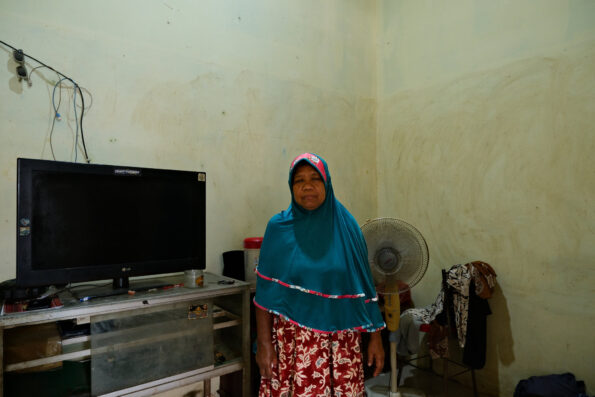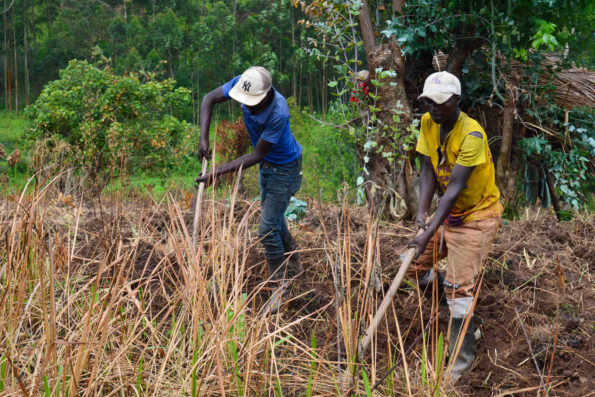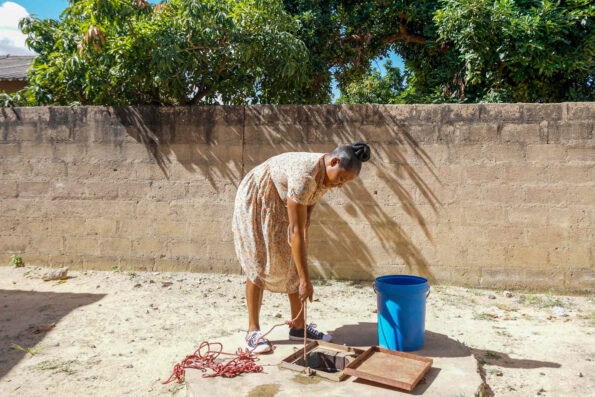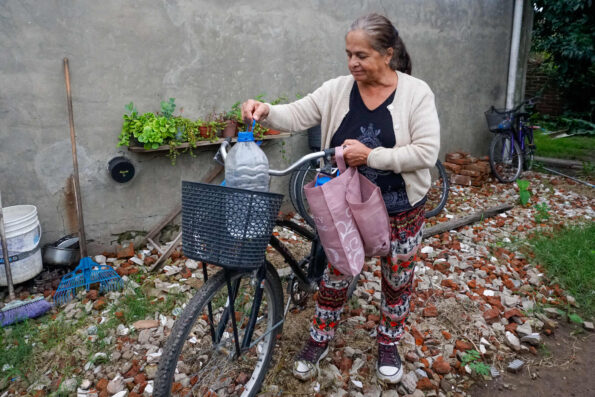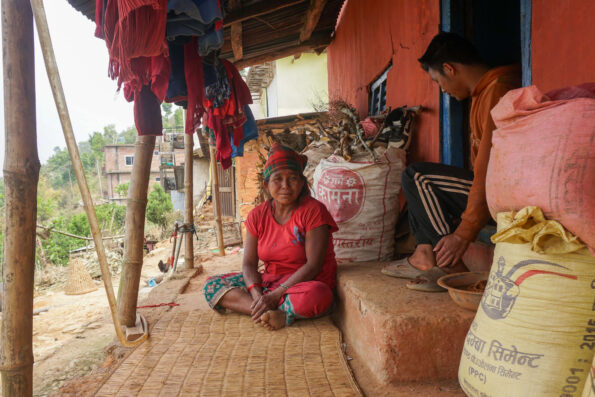
A manyatta is a typical home for the people of Marsabit.
MARSABIT, KENYA- She waved frantically at an oncoming vehicle. Finally, help had arrived. She breathed a sigh of relief, thinking that her grandchildren would now eat their evening meal before dusk, which was fast approaching.
Even as it began to set behind the hills, the sun was still scorching hot. “Please help our young get to the hills. They are tired and hungry. We have run out of clean water,” she pled with the driver of the van that had approached in a whir of dust.
Seeing that there was no space for all the three women and their children, the two older women volunteered to walk the rest of the way. The tired eyes of the children brightened in gratitude as they took their seats in the van. The generous travelers drove off with the children in a cloud of dust.
Mzee Bukure, 35, is the transport manager for the Catholic Justice and Peace Commission, CJPC. “We are only kind to women with children,” he says. “All they need is transport to their village which is many kilometers away.” Bukure is a native of Marsabit. He knows the land well. “But we cannot dare to stop for men. They are often armed bandits, ready to kill.”
Marsabit is a District in Kenya’s Eastern Province. Its inhabitants include the Gabra, Rendile and Borana tribes. It is one place in Kenya, among a vast frontier of rural land, that continues to face a multitude of insecurities. Travel is trying here, as many roads are rocky and impassable. Unpredictable weather brings challenges, hardships and loss. A water shortage impacts farming and families and a recent flood carried away livestock and broke bridges. And regional violence has increased over competition for limited pastures.
Climate Change Enhances Difficult Living Conditions
Marsabit is underdeveloped and few efforts are being made to formalize the settlement areas in the region. Nearly 170 miles from the nearest town, Isiolo, the road to Marsabit is impassable.
It is rugged, rocky and filled with loose sand plains.
“In the last six months, I have nearly had two fatal accidents while driving on this is road in my Landrover,” says Hillary Halkano, a resident of Marsabit and Programs Coordinator with the CJPC. “I lost control and each time, and the vehicle overturned. I am lucky to be alive,” he says.
Aside from the dangerous roads, the lack of natural resources makes life here a constant challenge. Water is scarce, due to a prolonged drought that seemed to end earlier this year when torrential downpours flooded the area. But those too have caused strife.
Generally, the desolate and bare terrain allows few crops to grow. Giant sand dunes are common amid the landscape here. It is, after all, a part of one of the world’s greatest deserts — the Chalbi. But this year, the salt-filled desert is impassible. It is flooded with water.
“Several of our people have perished following [the] heavy rains that have flooded our bridges since the beginning of 2010,” says Halkano of the CJPC. “The neighboring water ways of the Ethiopian Highlands have burst their banks. Its waters cross the Marsabit area and entered the Chalbi Dessert, leaving it flooded. The speed of the torrential waters breaks our bridges and carries our animals and vehicles away. It kills our people,” he says.
Many areas are still impassable, despite several new bridges having been constructed by Constituency Development Fund, CDF. CDF projects are funded by taxes paid by every citizen here, including the road tax, value added tax, VAT, pay as you earn, PAYE, tax.
The Kenya Police Reserve Provides Controversial Security
The droughts and floods have not only caused inconveniences and access issues, they are too the source of local violence. Inhabitants of the northern frontier are often left vulnerable to armed neighbors, especially during cattle raids. But formal police presence does not exist in Marsabit. Instead, residents rely on the Kenya Police Reserve, KPR, an entity formed in 1948 to help the government maintain law and order. Today, the KPR only operates in rural areas. The group has no uniforms and outdated weapons, making them appear as rebels themselves.
Many residents in Marsabit say they don’t trust the KPR. In a time when cattle raids and land disputes are frequent and often violent, many say the security provided by the KPR is inadequate, forcing local people to acquire illegal firearms in hopes of securing their families and livestock.
The pastoralist tribes here depend on their cattle, sheep, goats and camels as their main source of income and nutrition. Pastoralists rely on access to land and water to ensure the survival of their livestock. As these resources become increasingly scarce in Marsabit, feuding and raiding has resulted. Local residents say that competition for these resources results in the cultural practices of cattle rustling and raiding, which can escalate to violence.
The KPR, armed only with obsolete rifles are the first line of defense against bandits and cattle raiders.
“During livestock raids, we (the KPR) usually take more than a day to reach the place of attack. Today, although the government provides us with guns, they are unable to supply bullets. Previously, we were given 50 pieces each. The lack of bullets is a disadvantage during combat,” says Mamo Dido, 30, a former police reservist in North Horr Constituency of Marsabit District.
Dido was forced to quit his reservist job after he lost a leg during combat with the Turkanas in 2005. To date, he has not been compensated for his injury. With the help of his church and family members, he recently purchased a prosthetic limb.
In addition to their lack of weapons, it is also widely believed that the KPR has not only failed to protect local people but has also become a threat to the peace. “They are ethnic-based home-guards and during cattle raids, they become part of the raiders,” says a former chairman of Marsabit Peace Committee, Jeremiah Omar.
As members of the KPR, often called home guards, members are expected to be neutral, maintain order and build peace. But tensions often give rise to biased protection or members of the force participating in cattle raids for their own gain.
Halkano confirms Omar’s claim. The KPR suffers from low pay, little local respect or recognition and proper uniforms. Halkano says many of the officers are “destitute and poor.”
Still, others say that despite the trouble caused by the KPR, residents of Marsabit, especially those in the Chalbi Dessert, don’t want to see the government disband police reservists in the area.
The importance of KPR has been recognized by the highest office in Kenya – that of the incumbent President, Mwai Kibaki. In 2007 while on a campaign trail, president Mwai Kibaki noted that the Kenya Police Reserve are “better placed to tackle banditry menace and therefore put bandits on notice to stop their criminal activities.”
“The reservists know the terrain better and are able to travel over long distances without resting. The police are often unwilling to cover similar terrain by foot, when their vehicles are unavailable,” Halkano confirms.
New attempts are being made to establish peace between the tribes fighting for local resources. The CJPC recently created a youth exchange program that brings young people together across tribe and culture. Dubbed the Peace Ambassadors, selected adolescents are sent into neighboring communities to promote peace among rivaling groups.
“This youth exchange program prevents raids. Rivaling communities cannot attack a village where their young are residing,” says Eva Barare. So far, the program seems to have reduced tensions significantly.
“We are paid some allowance for our upkeep,” says Amina Hassan, 16, a Peace Ambassador residing in Dukana. “Since I came here, my people are more peaceful,” she adds.


